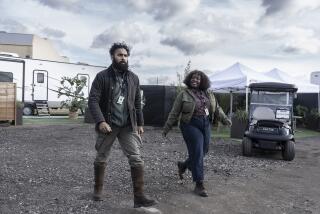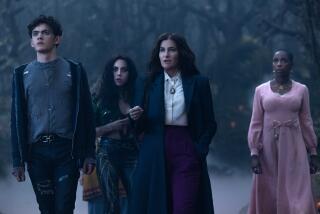Director Josh Trank on the bumpy road to ‘Fantastic Four’: ‘It’s been nuts’
Saying that “Fantastic Four” has had a rather bumpy road to the screen is a little like saying that Reed Richards can touch his toes.
For the past year, director Josh Trank’s reboot of 20th Century Fox’s superhero franchise has been met with a veritable tsunami of negativity, from complaints over Trank’s decision to change the race of Johnny Storm, to rumors of a troubled production, to reports (denied by Trank) that the director was fired from a planned “Star Wars” spinoff movie, to a publicity tour that has hit a few rough patches.
Starting Friday, moviegoers will finally get a chance to see what Trank has done with Marvel’s First Family – Reed Richards (Miles Teller), Johnny Storm (Michael B. Jordan), Sue Storm (Kate Mara) and Ben Grimm (Jamie Bell) – and decide for themselves what they think of the film. Though reviews have been less than fantastic, to put it mildly, the film is expected to top the weekend box office.
In June, Trank (who directed the 2012 sci-fi sleeper hit “Chronicle”) and writer-producer Simon Kinberg (whose credits include “X-Men: Days of Future Past”) sat down at the film’s production offices on the Fox lot in Los Angeles to talk about what drew them to the franchise, their decision to take a different approach to the superhero genre and what it has felt like to have so many fans declare it clobberin’ time on their movie.
Josh, back when you were making “Chronicle,” were you already thinking you wanted to take on a superhero franchise?
Trank: Absolutely. It’s always been a dream of mine to make a movie of this size and specifically with a property that I grew up loving. For me, it was always Fantastic Four and X-Men.
In the fall of 2011, I was in post-production on “Chronicle” and Fox had an option on me to do another movie. I got on the phone with [Fox president of production] Emma Watts and she asked me if I like Fantastic Four. I said, “I love Fantastic Four, and I actually have an idea if you’re open.” I pitched her a movie where we’d make the science modern and the accident where they get their powers would play out as a horror scene.
In high school, I wrote Cronenberg-inspired short films about people in a hospital with telekinetic powers. This movie felt like an opportunity to explore this canvas that I’ve always dreamt of.
Simon, what inspired you to get on board?
Kinberg: To be honest, I read the comic when I was a kid but I wasn’t a die-hard Fan 4 reader. I was at the end of a one-year odyssey of making “X-Men: Days of Future Past,” and I didn’t think I’d want to make another comic-book movie right away. So Emma said, “Call Josh.”
I called him and he basically pitched me on the phone what we’re talking about right now. And the thing that really hooked me was: What would the honest reaction be if you suddenly didn’t have control over your body anymore – if you were uncontrollably on fire or invisible or you were a rock creature? That just seemed so original in a genre that it’s hard to be original in.
We ended up talking for an hour or so, and then I called Emma back and said, “I’m in.”
You got a lot of push-back from fans not just for taking the franchise in this more Cronenbergian direction but for changing the race of Johnny Storm by casting Michael B. Jordan and casting the relatively small Jamie Bell as Ben Grimm. Were you prepared for how upset people would get?
Trank: Yeah, I knew it was going to get ugly. But I don’t know, I think maybe there’s a part of me that needs adversity from the rest of the world in order to feel motivated to want to prove people wrong.
I don’t know if that’s an unhealthy way of approaching life but to give an example: When I was in middle school and high school, I was over 100 pounds overweight. I had a condition called gynecomastia – I had really big man boobs – and I got a surgery for it. Up until I was 17 or 18 when I started working out and got really skinny, my whole adolescence was hating myself and hating my body and feeling suicidal. I was made fun of by a lot of kids in such a way that I didn’t feel like I was human. That fueled my desire to want to prove people wrong by just writing things and shooting things and being proactive. I’ve still always felt like that kid.
Coming off of “Chronicle,” I had the opportunity to do any movie that would have an easy cool-card route – if you do a Batman movie, it’s instantly cool. But I need people to be like “What is this weirdo doing?” in order to feel, like, connected. And I made every single choice [on “Fantastic Four”] knowing that people would question it.
Kinberg: I think it’s true for a lot of movies that you can take license with adapting the underlying material and you will be forgiven for it if it’s good — and you will not be if it’s bad. If you look at Hugh Jackman, everybody was upset at first that Wolverine was tall and now nobody can imagine anybody else playing Wolverine.
People are religious about comics the way people are religious about the Bible. There are some people who are fundamentalists and they don’t want things to be changed and they take things very literally – and then there are others who are open to a new interpretation as long as it stays true to the essence of the original material.
The irony is, comics themselves change all the time.
Kinberg: It’s true. Good guys become bad guys. Bad guys become good guys. People die and come back to life. They change races. They change sexuality.
At the end of the day, everybody kind of wants the same thing from these movies, which is for them to be good. The fans are fervent about it, and the filmmakers obviously have a lot invested in making them good. I think there’s change for change’s sake and there’s change with purpose. When there’s a change that has a creative reason behind it, an artistic purpose to it, the fans forgive it because they feel like, ‘OK, I understand why you did that.’
Trank: I’ve had friends who are die-hard comic fans who were very confused with what I was doing. And a lot of people have really turned around because they understand that there’s a deep respect for the essence and the archetypes that made them fall in love with these characters in the first place.
This movie takes its time introducing the characters and the world before it gets to any giant action set pieces. What was the thinking behind that?
Trank: The setup is very bold. We spend our time in the beginning. It’s very risky. But there was never a moment that I remember hearing anybody from any higher authority say, “We need to throw some action scene into there.” The main thing was, like, “Are people invested in these characters? Are people going to like these characters?”
You can’t ever compete with a $250-million budget from these giant Marvel movies. Those movies do a very specific thing. And what’s cool is to have different flavors out there, different choices, coming out different times in the summer. A movie like this is more like a meal where you take your time and you really fall in love with these characters. It’s a different thing.
Almost from the start, this movie seemed to have a target on its back and was taking a beating from many fans even before they’d even seen so much as a trailer. Why do you think that is?
Kinberg: I’ve never seen anything like it. I’ve thought a lot about it and the honest answer is, I don’t know. I think in some ways people just decided this was the one. I think the hard-core fans didn’t like the last couple of Fantastic Four movies, so there’s a bit of a chip on their shoulder about the franchise and the title. They went into the notion of a new Fantastic Four movie with a little bit of cynicism.
We talked about it a lot while we were shooting, because it was Josh’s first time experiencing that and I’ve been through it a couple of times. I’d just be like, “Just don’t look at it. Nothing good will come of it.” And you did a good job of ignoring it.
Trank: It was hard after that [Hollywood Reporter] article came out [reporting Trank had been fired from “Star Wars” spinoff due to problems on “Fantastic Four’s” set] because it was personal. That was the biggest, most ugly hatchet job spin piece I’ve ever seen in my life.... I’ve been turned into a punching bag for some reason. It’s just been an avalanche of things. It’s been nuts.
Kinberg: I’ve been around some version of this for a long time. This, I would say, is particularly cruel. I haven’t really seen this level of vehemence against a filmmaker. And it’s surreal and unfair.
Trank: It might be my age too.
That you’ve somehow gotten too much too soon?
Trank: Yeah, I don’t know.
Kinberg: I think that’s part of it.
Trank: It’s also people who’ve never met me before. If they met me – I don’t know, I feel like I’m a pretty harmless person.
I’m sure you’re anxious for the movie to open, because then people will be talking about the movie itself and not about all the buzz and drama surrounding it.
Trank: Yeah. That will be really nice.
Twitter: @joshrottenberg
More to Read
The biggest entertainment stories
Get our big stories about Hollywood, film, television, music, arts, culture and more right in your inbox as soon as they publish.
You may occasionally receive promotional content from the Los Angeles Times.











